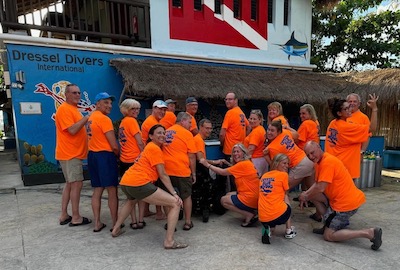It's super simple...
Step 0 - Find an awesome instructor
...and/or...
Step 1 - Find a shop that fits your vibe and is local
Step 2 - Sign up for the Open Water Certification and 4 Open Water Dives (~$600)
Step 3 - Buy the minimum gear (~$350)
Step 4 - Complete the online classes
Step 5 - Complete the pool sessions [2-5 sessions over 2 days]
Step 6 - Complete the open water sessions [4-6 sessions over 2 days]
FINISHED - Congratulations! You're a certified scuba civer.
In total, you should budget around $1,000 to "Get Your Card." While you might save $50 here or there, the general cost is about $1,000.
Step 0 - Find an awesome instructor
...and/or...
Step 1 - Find a shop that fits your vibe and is local
Step 2 - Sign up for the Open Water Certification and 4 Open Water Dives (~$600)
Step 3 - Buy the minimum gear (~$350)
Step 4 - Complete the online classes
Step 5 - Complete the pool sessions [2-5 sessions over 2 days]
Step 6 - Complete the open water sessions [4-6 sessions over 2 days]
FINISHED - Congratulations! You're a certified scuba civer.
In total, you should budget around $1,000 to "Get Your Card." While you might save $50 here or there, the general cost is about $1,000.

* Crystal Blue Diving - Cozumel Trip 2023
Step 0 - Find an awesome instructor
It is absolutely true that a great instructor will make you a better diver sooner. If at all possible, I highly recommend you go with one of our recommended private instructors. At the end of the day, the cost for a quality open water class from a private instructor is going to run you a couple hundred bucks more than a local shop but you'll get so much more out of your class. This is not a function of private instructors necessarily being better than an instructor who works for a shop. To make the class financially viable, the shop has to have at least a handful of students in the class for every one instructor. The primary goal is to get you done quickly (time = cost), without violating training standards. It is primarily a function of the scuba training market, not the quality of the instructors...usually.Step 1 - Find a shop that fits your vibe
While it's ideal to choose an instructor, in reality, it may be more practical to start with the shop. Non-private instructors are not often available to speak with before you commit to a class, and shops typically have multiple instructors.Here is what to consider when selecting a shop:

- First Impressions: When you visit, is the shop clean and welcoming? Did someone greet you, or did they seem annoyed?
- Selection of Gear: Ensure they have a good range of masks and fins since you'll likely buy your basic gear from them. Many shops offer discounts if you buy gear and sign up for classes together.
- Location: They don’t have to be around the corner, but they should be conveniently located for you.
- Website and Social Media: Check if they are active and well-maintained. A lack of updates might indicate a shop owner who is just going through the motions or a lack of engagement.
- Equipment Services: Shops that service their own equipment show a higher level of expertise.
- Customer Service: Is the staff genuinely helpful, or are they just trying to show off?
- Air Fills: Availability indicates a technically competent and active shop.
- Convenient Hours: Ensure their hours work with your schedule.
- Onsite Pool: Convenient but not essential.
Step 2 - Sign Up For the Open Water Class
Check out my What To Expect page for more details on the Open Water classStep 3 - Buy The Minimum Gear
Why do you need to buy your own gear? Because the industry said so. Honestly. Apart from the mask, which needs to fit you personally, fins and snorkels should be rentable. However, since dive shops don't make much profit from training alone, they require you to buy gear to sustain their business. While this increases the initial financial barrier, it's understandable.- Mask: This is a personal fit item, so you need your own.
- Fins: Stick with traditional fins, no split fins or tech fins to start
- Boots: If required, get some 5mm boots of whatever brand your shop sells; they're all generally similar.
- Snorkel: Go for the cheapest one offered; there's a high chance you won't use it much after certification.
This approach ensures you have the essential gear while supporting your local dive shop's sustainability.
